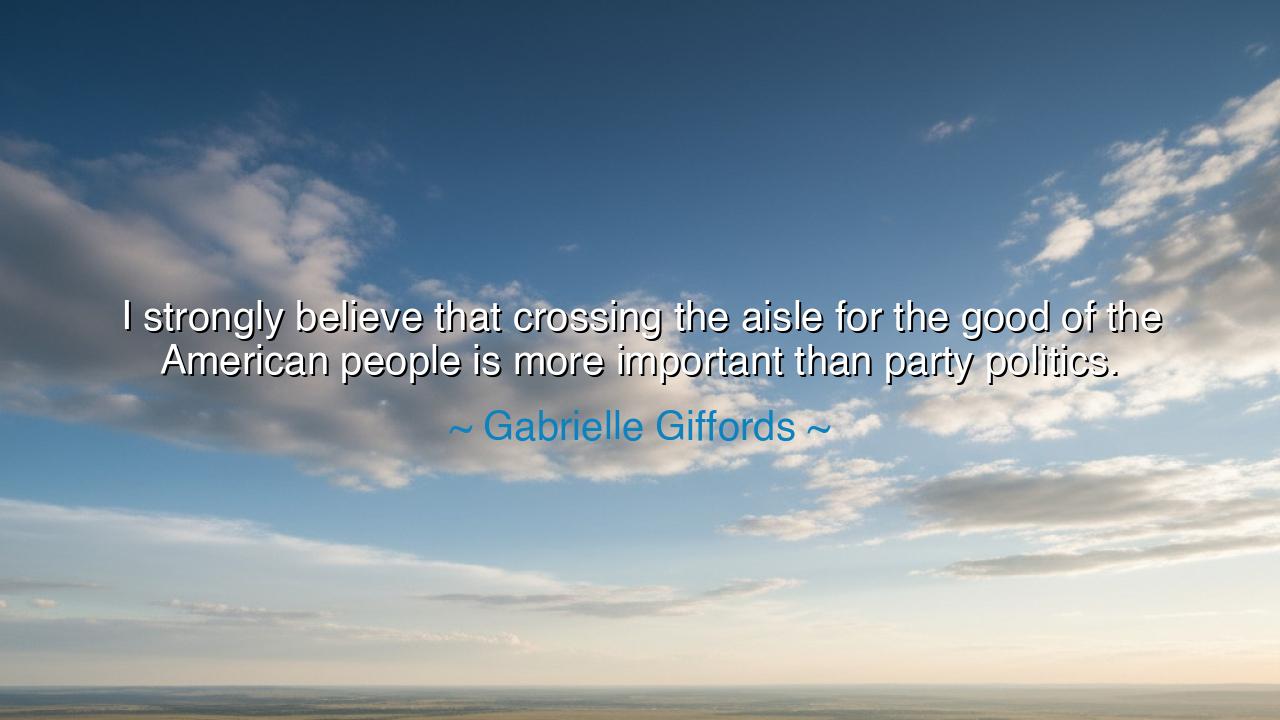
I strongly believe that crossing the aisle for the good of the
I strongly believe that crossing the aisle for the good of the American people is more important than party politics.






The words of Gabrielle Giffords, “I strongly believe that crossing the aisle for the good of the American people is more important than party politics,” shine with the light of unity over division. She reminds us that the purpose of politics is not to feed factions, but to serve the people. When rulers and lawmakers become chained to the banners of their parties, they risk forgetting the faces of those they swore to represent. To cross the aisle is to place country above party, the common good above narrow loyalty.
The ancients too knew this wisdom. In Rome, the Republic often teetered between rival factions of patricians and plebeians, but its survival depended on leaders willing to bridge those divides. Compromise, though bitter to the proud, preserved the state and gave birth to enduring laws. Giffords echoes this truth for our own age: the health of a nation lies not in perpetual strife, but in the courage of leaders who can embrace opponents for the sake of the whole.
History offers a shining example in Abraham Lincoln’s “Team of Rivals.” When he gathered into his cabinet men who had once opposed him, he embodied the spirit of crossing the aisle. Their counsel, though diverse and often conflicting, sharpened his leadership and helped preserve the Union. Had he clung only to allies, his government would have been weaker. Lincoln’s story proves that true greatness often grows from unity across division.
Giffords’ words are born not from theory but from lived struggle. As one who suffered grievously at the hands of violence yet returned with courage to speak for peace, she knows the weight of what she declares. Party politics may divide, but the lives of the people—whether in schools, homes, or communities—demand cooperation. To elevate service above rivalry is to heal, to build, and to honor the deeper purpose of government.
Let the generations remember this: nations fall when leaders fight only for faction, but they rise when leaders fight for the people. Crossing the aisle is no betrayal; it is the highest form of loyalty—to justice, to unity, to the enduring good of the whole. Thus, Giffords’ voice calls us to a higher path: that rulers set aside pride, and work as one, so that the people may prosper and the nation endure.






ATHoang Vuong Anh Tu
As a citizen, I’m thinking about incentives. We say we want collaboration, but primaries, gerrymanders, donor dynamics, and cable booking fees reward combat. What reforms would you back to flip the payoff function—open primaries, ranked-choice voting, independent maps, or bipartisan committee chairs? On the culture side, how should voters respond when someone breaks with their party for a good-faith deal—small donations, thank-you calls, or protection from primary challengers? I’m looking for a concrete playbook so we can reward courage instead of punishing it.
TNQue Tran Nguyen
Where does cross-party work deliver the most value? I suspect domains with shared risk and technical complexity: grid reliability, disaster readiness, supply-chain bottlenecks, overdose prevention, veterans’ services. Would you pilot “coalition sprints”: 90-day teams co-chaired by members from both parties, with limited scope, pre-agreed KPIs, and public demos of delivery? To protect momentum, keep comms boring—dashboards over grandstanding. If a sprint hits its targets, scale it; if not, sunset it without blame. Which problem would you nominate first, and what single measurement would tell constituents it’s working?
MDMinh Dinh
Here’s my worry: collaboration can become lopsided—one side yields substance while the other collects bipartisan optics. What safeguards keep conscience intact? I’d want explicit red lines around rights and equal treatment, an evidence baseline agreed in advance, and an independent fact-check appendix attached to every joint bill. Could you also pledge a “do-no-harm” test: if a compromise shifts burdens onto vulnerable communities, it’s a no? And when partners negotiate in bad faith, what’s the exit protocol—pause, publish the sticking points, and return to constituent-driven options instead of forcing a hollow middle?
Nnguyenlinhnga
As a reader, I love the aspiration, but “for the good of the American people” is slippery. How would you operationalize it so bipartisanship is a means, not a halo? Start with public criteria: clear problem definition, measurable outcomes (child poverty, small-business starts, bridge repair times), and a 12- and 24-month review to see if the deal worked. Pair that with a short negotiation memo listing trade-offs and the rationale for each. Finally, commit to switching course if the data disappoints. Would you endorse a bipartisan “results docket” that prioritizes kitchen-table issues and publishes quarterly service metrics, rather than press releases?